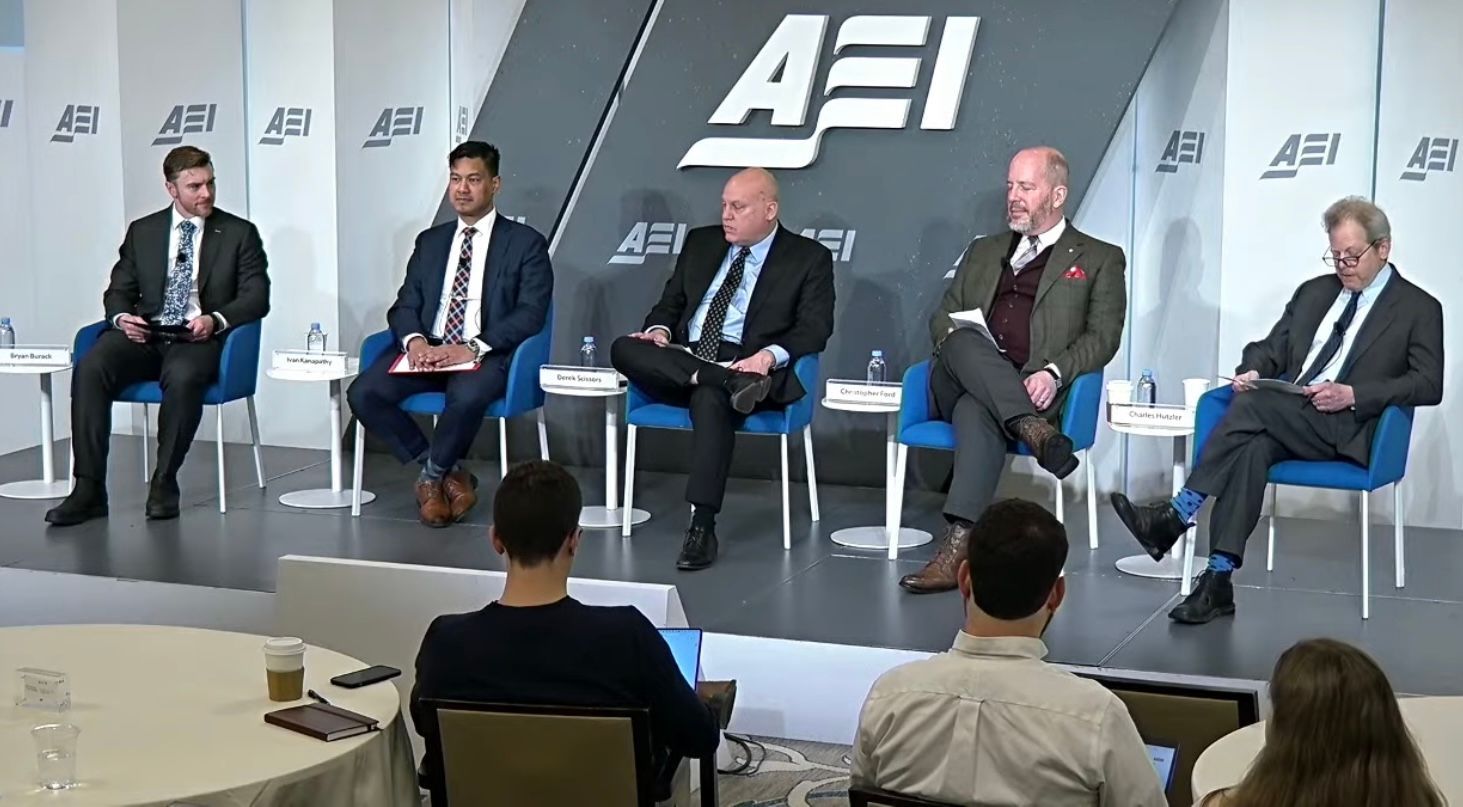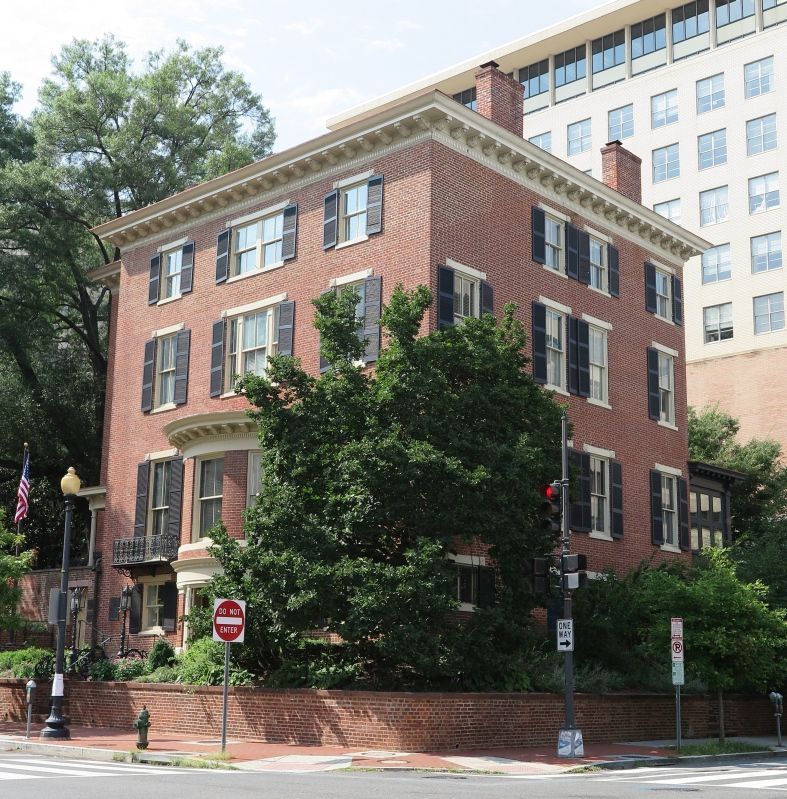The Hon. Christopher A. Ford
New Paradigms Forum -- International Security Policy Since 2009
The U.S. Nonproliferation Agenda and the 2010 NPT Review Conference
Note:
These remarks were given at the Sandia National Laboratory in Albuquerque, New Mexico, on March 24, 2010.
Let me start by expressing my thanks to the kind folks at Sandia for inviting me to speak here today, and for your kind introduction. This is my first trip to Sandia since leaving government, and it’s a pleasure to be here again.
RevCons and Reification
When I was doing nonproliferation diplomacy for the Bush Administration, foreign counterparts and NGO representatives would speculate endlessly about what would need to be done “for” the 2010 NPT Review Conference (RevCon), and what would be accomplished at that meeting to solve the challenges facing the nonproliferation regime. This reification of the NPT review process always struck me as strange, for such meetings of course don’t actually do anything in the formal sense, and – with the exception of the NPT’s extension in 1995, which was specifically provided for in the Treaty itself – such agreements as are occasionally achieved are political rather than legal documents. Review Conferences are hardly unimportant, but they certainly don’t live up to their diplomatic hype, and I used to wonder about this.
Part of this enthusiasm for the NPT review cycle was probably an example of the sort of phenomenon described by Bernard Baruch in observing that when all you have is a hammer, everything starts to look like a nail. It would indeed not be surprising if NPT diplomats were to inflate the significance of their own small professional niche vis-à-vis the rest of the world and see progress on the matters in their own portfolio as being the key to solving all the world’s problems.
Part of the reification of the review cycle, I think, is also a manifestation of wishful thinking. Because the Treaty does not actually say what so many participants in the process wish it to say – specifically with regard to disarmament, though perhaps not here exclusively – many who work on these issues have tended to project upon the review process their fervent desire for a treaty that wasn’t actually negotiated in 1968, investing review proceedings with a pseudo-treaty-law significance that they find politically and emotionally satisfying (and necessary) precisely to the degree to which it does not represent reality.
Whatever the reason, however, RevCons are today generally treated as being of enormous importance not just as a global forum for debate and discussion on nuclear weapons-related issues – and not just as a snapshot expression, for good or for ill, of views on Treaty-related matters – but in fact as things of surpassing import in and of themselves.
It may also be that I object too much. In the world of politics, perception sometimes is functionally equivalent to reality. So perhaps I’m tilting at windmills to try to deflate the RevCon balloon of symbolic position-taking and draw participants back to the tougher business of actually trying to change nuclear weapons-related “facts on the ground.” If everyone thinks the existence or non-existence of a RevCon consensus is important, it will in a sense be significant, whether it deserves to be or not. So let’s look at the upcoming NPT RevCon through the prism of this reification.
The Crisis of Nonproliferation Compliance
One thing I very much fear this RevCon will bring is very little progress on the most important problem facing the NPT today: compliance enforcement. With respect to longstanding assumptions that the Treaty can be relied upon to keep non-nuclear weapons states from breaking its rules by acquiring nuclear weapon capabilities, the NPT seems to be entering its “Emperor’s New Clothes” phase. The king stands horribly naked in the square, and it is dangerously late to start weaving him some real robes.
For reasons I hardly have to explain here, the collapse of compliance enforcement seems likely to have all manner of follow-on effects harmful to international peace and security. What can the RevCon do to forestall this? Probably not too very much. The key to handling today’s crises of nonproliferation compliance, if there is one, is to be found in national capitals, not a multilateral talk shop without real decision-making authority. It lies, for instance, with the continuance or cessation of the U.N. Security Council’s weakness and vacillation on Iran, with various governments’ willingness or unwillingness to use their national levers of power, and – most broadly – with countries’ willingness to bear concrete burdens and take real risks in order to control proliferation-related threats to international peace and security.
Events at the RevCon could make things worse, of course, by demonstrating the degree to which States Party do not care about enforcing compliance with nonproliferation rules, but at this point I suspect it really isn’t within the power of the NPT review process to make things better.
This, of course, presents a huge challenge for U.S. diplomats under the best of conditions, though they have of late made things even harder for themselves. By deliberately playing to the political grandstands for the last year or so in inflating expectations of dramatic progress towards nuclear disarmament, U.S. officials have set themselves up for diplomatic failure on precisely the territory they have staked out for their international debut. These problems have been compounded by longstanding claims that disarmament-facilitating U.S. positions will be reciprocated by greatly improved cooperation against proliferation by other governments.
We now have a president who is willing personally to take disarmament-friendly positions that were previously articulated only at the head-of-delegation level at NPT Preparatory Committee meetings (PrepComs) – for two examples, click here and here – or at the Conference on Disarmament (CD). Indeed, President Obama was actually awarded the Nobel Peace Prize for his approach. The 2009 NPT PrepCom was awash with adoration for President Obama and his disarmament agenda – which actually builds upon years of dramatic nuclear arms reductions by the previous four presidents. But there has been no nonproliferation “payoff.” If anything, proliferation problems have worsened.
Despite Iran’s continued defiance of the international community, its programs remain unchecked and the Security Council sits idle months after the expiration of the latest of innumerable “last chance” deadlines given to the clerical regime in Tehran – even as the Iranians proclaim their pursuit of new enrichment facilities and dig existing ones ever deeper into mountains while preparing to defend them with anti-aircraft missiles conveniently provided by Russia. North Korea seems no more likely to give up its nuclear weaponry than ever, and around the world multiple governments seem to be edging ever closer to pursuing their own nuclear “options.”
Diplomatically, the new high-profile U.S. push for disarmament is being met only by arguments that all this is not enough, and that there is still somehow a crisis of disarmament noncompliance that makes the NPT fundamentally “inequitable” and deserving of revision or abandonment – a carefully pre-established “excuse” for anyone who wishes to become an Iranian-style scofflaw in the future. This RevCon, I think, will provide no nonproliferation “payoff,” and will instead demonstrate just how unrelated disarmament is to the crisis of nonproliferation compliance.
Everyone except the new U.S. Administration seems to be preparing for this. Hawks, of course, are surely preparing talking points crowing about how all of this demonstrates the bankruptcy of the disarmament enterprise as a whole. On the other side, the disarmament community is already readying itself for the sort of “good-tsar-bad-ministers” explanation traditionally used by oppressed Russian serfs to justify continued subjection to their reigning despot. (President Obama wants disarmament, this narrative runs, but his Nuclear Posture Review is being hijacked by evil revanchiste elements within the military-industrial complex.) Others on the Left, at home and abroad, may conclude that Obama has simply deceived them by playing a game of bait-and-switch which was never really much about disarmament in the first place. Such explanations will presumably be wheeled out to justify continued non-cooperation on nonproliferation, and the “we’ll-start-to-cooperate-if-you-disarm-faster” mantra will continue to be the refrain. Such pious protestations from nonproliferation foot-draggers will, of course, be nothing like reasons for their inaction – being instead merely excuses for it – but they will be offered nonetheless.
In truth, much such criticism and disappointed posturing will be unfair. We don’t yet know what the Obama Nuclear Posture Review (NPR) will say, but while it’s sure not to look like what the disarmament community came to expect after Obama’s speech in Prague last April, my guess is that the Administration will still have a decent case to make that its steps are consistent with a serious disarmament program.
I myself, beginning when I spoke on behalf of the Bush Administration , have made the point many times that anyone who really wants to see U.S. disarmament should applaud efforts to modernize and rationalize (if also to shrink) the sprawling Cold War-era U.S. nuclear weapons infrastructure, ensure against reliability problems and improve the safety and security features built into in our aging stock of warheads, develop ever-better non-nuclear means of fulfilling nuclear weapons missions, strengthen the non -nuclear aspects of our alliance relationships in order to make up for proliferation-risky suspicions that our extended nuclear deterrence is weakening as our numbers come down, and develop much better missile defenses. Should President Obama end up adopting what is in effect such a position – that is, pursuing such steps in conjunction with additional nuclear arms reductions, and indeed in order to make such cuts possible ( e.g. , not foolish) – the causes of disarmament and U.S. national security will probably be well served. If he does this, I, at least, will applaud.
But the considerable substantive merit of such a position wouldn’t make it any less of a diplomatic headache for the United States. It would presumably not be well received if Obama’s posture is interpreted as being as sort of “Bush Lite” policy, or even simply as a continuation of the fundamentally disarmament-friendly but cautious and still security-minded approach Bush officials articulated in NPT fora and at the CD from early 2007. Nevertheless, I think no NPR that represents a serious attempt to preserve and advance U.S. and global security interests could fail to disappoint the very disarmament community that Obama has taken such pains to court.
Post-START Headaches
The problems for U.S. diplomats at the RevCon will be all the more acute on account of the decidedly modest nature of the post-START agreement now – still, endlessly – being negotiated with Russia, which seems likely to contain only reductions which I think wouldn’t have been entirely shocking from the Bush Administration which actually began these same post-START talks in September 2006.
[ Note: Press reports have subsequently suggested that deployed warhead numbers in the new treaty are being set at about 1,500 – down 200 weapons from the bottom end of the range band set by the Moscow Treaty of 2002. ]
Yet even these humble steps were almost too much for Russia to accept absent lavish payment, with Moscow having – I think correctly – read Obama’s concessions on European missile defense as a sign of weakness. Having happily pocketed Washington’s preemptive capitulation on this issue, Moscow demanded more.
[ Note: Press reports have said that Moscow has obtained a reference to missile defense in the new treaty’s preamble, and officials close to the Russian delegation have claimed that Russia has claimed or actually obtained the right to withdraw from the treaty if the “spirit” of the preambular reference is violated ... whatever that actually means. ]
(Another incongruity is that the Obama Administration also seems to be returning to a Cold War-style approach to reductions in which U.S. moves are expected to take place in lockstep with Russian moves. Substantively, I think this is unwise – and in fact from a disarmament perspective, it is quite a retrograde movement from President Bush’s willingness to move unilaterally and merely invite Moscow to come along, which is what led to the Moscow Treaty. Since Russia doesn’t seem remotely interested in a nuclear “zero,” moreover, such an approach might also signal doom for deep disarmament: we may be able to make another round of modest cuts together, but if everything is to move in lockstep between Washington and Moscow, the window for additional reductions will at some point simply close.)
The Obama Administration will surely get some “New START” treaty – so that they’re not left merely with their own perhaps awkwardly Bushlike NPR as the only American “deliverable” before the RevCon – but it’s quite depressing how difficult the whole process has been. This treaty, let’s remember, was supposed to be the easy case: relations with Russia could be turned around, it was assumed, by a showy pressing of the diplomatic “reset button” by smiling Americans who weren’t George W. Bush. Well, so much for that. In keeping with Obama Washington’s apparent nostalgia for the pursuit of Cold War-style arms deals, Russia has returned to Cold War-style negotiating tactics. (Tellingly, Russia just thumbed its nose at Secretary Clinton by greeting her visit to Moscow with Prime Minister Putin’s announcement that Russia will soon finish the Iranian nuclear reactor at Bushehr – simultaneously demonstrating both how not “reset” things really are with the siloviki state and how little connection there is between disarmament moves and nonproliferation progress.
RevCon Deliverables?
What about other potential RevCon deliverables? For the moment, I suspect, we should simply forget about the Comprehensive Test Ban Treaty, which is in no danger of escaping from the U.S. Senate any time soon. As for a fissile material cutoff treaty (FMCT), the CD seems still to be so hopelessly snarled that I’ve even heard some disarmament advocates starting to come around to the idea I pitched last year in Arms Control Today of taking FMCT out of that body entirely. Don’t expect too much from the “Nuclear Security Summit” next month either. Discussing and “raising awareness” about nuclear materials security in order to prevent nuclear terrorism is unquestionably a good thing. Merely getting world leaders to declare their desire for “ the highest levels of nuclear security ” may not seem like a dramatic accomplishment, however, given that they have already been doing this for years under the aegis of the Global Initiative to Combat Nuclear Terrorism.
If a generation or more of diplomacy had not so reified the NPT review process as the barometer of the health of the nonproliferation regime, all this might not be so problematic at this particular time. Obama diplomats seem now to be trying to downplay expectations for the meeting, but of course this comes on the heels of years of snidely denigrating Bush policy in connection with the 2005 RevCon and giving remarkably brazen reassurances to foreign interlocutors that when we’re in power everything will finally be alright and the next RevCon will put the nonproliferation regime back on an even keel. Well, we’ll see.
Middle East Problems
Let me add to the list of our diplomatic woes, moreover, by mentioning one more: the Middle East. For some years now, the governments of the Arab League have been methodically building the political foundation for offering a sort of ultimatum to the NPT community. Allegedly, this effort is all about Israel: Arab governments, led by Egypt, wish us to believe that now, 15 years after the Resolution on the Middle East adopted at the 1995 RevCon, their frustration with inaction on the Israeli nuclear question has finally reached the boiling point. They demand movement on this issue, they say … or else. They don’t say what the “or else” is, of course, but the implication seems to be that they may conclude that the NPT is unworthy of their continued adherence.
(There are already rumors of Libyan diplomats quietly carrying Egypt’s water by passing around draft amendments to the Treaty. At least one public account has even claimed openly that amendment options are “ being discussed and may be activated by the disaffected nations” if the 2010 RevCon does not adequately address the issue of NPT “holdout states who have moved over the [nuclear weapons] threshold and enjoy a favoured relationship with the Western NWS [nuclear weapons states].”)
My suspicion, which I have voiced before, is that this campaign has at least as much to do with Iran as with Israel. Arab governments have long lived with Israel’s nuclear opacity – a term used by Avner Cohen and of which I am fond – but orchestrating a crescendo of anti-Israeli agitation now may be felt to provide the perfect excuse for governments looking to hedge their strategic bets vis-à-vis a proliferating Iran in ways that are politically acceptable on the Arab “street.” (Is it entirely a coincidence that the Arab campaign for action on the “Middle East issue” became a high diplomatic priority after the revelation in late 2002 of Iran’s secret nuclear program?) In this context, anti-Israeli positions are always safe ones.
Whether or not this campaign is really about Israel, it may well come to a head at this RevCon. (After all, the Arab governments might have to wait some time for another such opportunity. Most obviously, by the time the 2015 RevCon rolls around, it may feel awfully late to begin preparing to counter an Iranian nuclear weapons threat by one’s own countervailing proliferation.) Egypt played the key role in collapsing what hopes of limited consensus there were at the 2005 Review Conference. It is anybody’s guess how the Middle East wild card will affect 2010.
U.S. officials profess to be working closely and cordially with their Egyptian counterparts in preparation for the upcoming meeting, but they also clearly seem uncomfortable. The Bush Administration was not so bewitched by the idea that one must have consensus agreement at NPT RevCons that Egypt’s scuppering of the last-minute deals being worked out in 2005 was considered an absolute disaster in Washington. But can President Obama politically afford a RevCon “failure” after all his administration has done to fan the flames of RevCon reification and create the impression that his arrival in office is the key to solving the regime’s problems? My guess is that some people in Cairo are betting that he cannot. The principal remaining question is what they will demand of him, and which side will blink first.
A Better Way?
All in all, I really see no way to finesse all of these challenges diplomatically, and I think it is only a losing strategy to try to continue the business-as-usual approach of trying simply to sweet-talk and posture our way into the good graces of those who care much about disarming the United States and remarkably little about stopping proliferation. This is not a diplomatic game that we can “win” by buying into – and meeting the ever-shifting demands made by – the agenda of the remarkably large number of players who, at the end of the day, see the United States and its nuclear and (especially) conventional power as a bigger problem than nuclear weapons proliferation. Diplomatic business as usual, in this context, is a strategy for failure.
If there is a way out of the conundra of modern NPT diplomacy, I think it lies in explaining ourselves and the merits of how our vision for a more secure and indeed less (and potentially much less) nuclear-armed global environment makes sense. We must make this clear – and where necessary, painfully clear – even, and perhaps especially, where our vision differs in significant ways from the diplomatic conventional wisdom.
President Obama, unlike President Bush, is in fact ideally positioned to mount just such a diplomatic offensive. And he’s quite capable of doing a decent job of it, if he has to. We saw this in Oslo where he went to pick up his Nobel Peace Prize just after ordering many thousands of additional troops to Afghanistan. The president offered there a fairly eloquent exposition of just war doctrine to a European audience that seemed to have forgotten it, and the president was right. This personal presidential outreach should be a model: the next phase of American disarmament and nonproliferation diplomacy should include explaining and resolutely defending – rather than dodging or apologizing for – those elements in the U.S. approach to global security which depart from the expectations and hopes and of the diplomatic and disarmament communities.
That audience would not accept such honesty and engagement from representatives of George W. Bush. (I think we established this pretty conclusively, and it wasn’t for lack of trying.) They may not accept it even from our current Nobel Laureate-in-chief. No one , however, is better positioned to try. Perhaps President Obama can have his own “Nixon-in-China” moment, an apparently passionate dove becoming the ambassador of United States and indeed global security equities to a diplomatic community that so often gives every sign of caring for neither.
Alas, that does not appear to be the present U.S. agenda for the 2010 NPT RevCon, nor of the Obama Administration more generally – though perhaps they will surprise us. If we are to help the nonproliferation regime ride out its present-day storms, such an approach cannot long be avoided.
-- Christopher Ford



Copyright Dr. Christopher Ford All Rights Reserved






